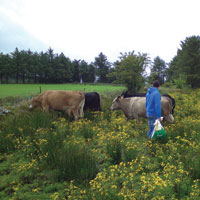 Some industries have actually prospered over the past couple of years. So it hasn’t been all gloom since the credit crunch took the world in its grip, as we discover…
Some industries have actually prospered over the past couple of years. So it hasn’t been all gloom since the credit crunch took the world in its grip, as we discover…
Farming industry: growing nicely
Nobody can say it hasn’t had its problems: foot and mouth disease, cheaper produce from overseas, food scares, the buying practices of supermarkets, government red tape and rising costs of essentials like fertilisers and feeds had almost knocked the stuffing out of the farming industry. But, surprisingly, the industry in recent months has been out-performing many other sectors of the economy. And, it seems, it is the recession that is pulling farmers out of the doldrums.
Caroline Spelman, the secretary of state for Environment, Food and Rural Affairs, says: ‘Food consumption is a constant through the ups and downs of economic cycles. Also, a lot of people are cooking and eating at home because of the austere times and it is a sector of the economy where we would expect jobs to be created. I think farming is coming up off its knees. My job will be to get it to stand tall and really contribute to the economic recovery that the country desperately needs.’
And to help the sector further, rather than turning their noses up at it, more and more students are keen to study agriculture. David Davies, acting faculty manager at the Gelli Aur College Farm in West Wales, says the college is experiencing a surge in student numbers. ‘The number of students attending the college has doubled over the past few years,’ he comments. What’s more, there seems to be no problem in the students finding jobs either. ‘We are proud to say that virtually no one leaving Gelli Aur is unemployed. We even have a list of people waiting to employ qualified students.’
‘We’ve survived because we’ve adapted’
Darragh Hunt is a 28-year-old farmer from County Roscommon in Ireland. He says he’s managed to keep profits up during the recession by making adjustments…
‘I run the farm that was owned by my late uncle and in 2008, I started a two-year advanced certificate in agriculture. Annually, 9,000 farmers attend courses to boost efficiency and to learn to use better technology and management practices. ‘I think we survive because we adapt. For example, grassland management is key in our suckler (calf) enterprise and we’re continually working on improving soil quality and nutrient management to increase yield and minimise cost. We are also trying to maximise gain from breed improvement. I will always be a farmer. Ireland has traceability from farm to fork. We’re highly regulated and have one of the highest standards of animal welfare and husbandry in the world.’
Music industry: drumming up profits
While many areas of the entertainment industry suffered at the hands of the downturn in 2009 – including sales of computer games which were down by 11% and DVD sales which were down 10% – the UK music industry actually grew by 5%. Coffers swelled largely due to live music events, according to the report from the Performing Rights Society (PRS). The net worth of the music industry in 2009 was boosted to the tune of £3.9 billion and £1.5 billion of that was generated through live music events. The 9.4% rise in profits of live events is mighty impressive, albeit slightly lower than the 13% growth seen in 2008. Festivals such as Glastonbury and Reading helped to generate money through direct ticket sales, secondary ticket sales and ‘on the night’ spend.
But it’s not just the live sector that’s doing it for the music industry. Record sales that had been declining for five years actually halted in 2009 – thanks to bumper sales of recordings by Michael Jackson, Susan Boyle, Lady Gaga and the Black Eyed Peas. The value of the recorded music industry, including CD and digital sales, was £1.36 billion in 2009, the same as in 2008. Will Page, chief economist at PRS, says: ‘This really is a remarkable outcome for the music industry in the face of the economic downturn.’
Fitness industry: in better shape than ever
While many industries were struggling to survive during the worst recession since the Great Depression of the 1930s, the fitness industry showed its muscle and emerged ever-stronger. Some 122 new facilities were opened across the UK during the 12 months to 31 March 2010, according to the 2010 Fitness Industry Association State of the UK Fitness Industry report. The registered membership base swelled to a handsome 7.4 million and the industry is said to be worth £3.8 billion annually. This is a rise of 1% on the previous year and represents the 10th consecutive year of growth.
Leading companies in the UK include Fitness First with 160 clubs, David Lloyd with 78 clubs and LA fitness with 80 clubs. David Minton, director of The Leisure Database Company, comments: ‘Ongoing investments by consumers in their health, despite difficult economic times, provides a solid platform to build on as the recovery builds. Over the past 12 months, where other sectors have seen poor results, the fitness industry has maintained its performance levels.’
‘Staying healthy matters to many’
Michele Hart, 44, is a self-employed fitness instructor and feels the industry is as robust as ever.
‘Member numbers are similar to before the recession. There have been a few cutbacks within gyms – such as saving on energy and maintenance, ordering of equipment and staff hours – but the service is still good.
Pictures: matt leech


